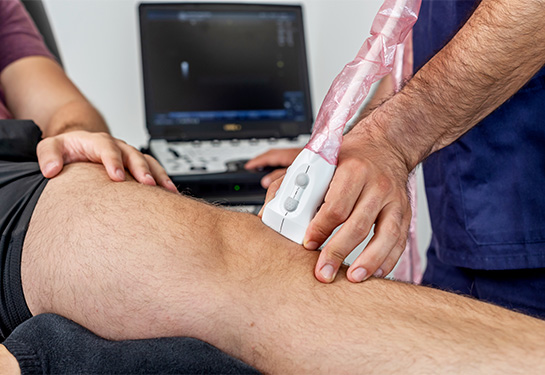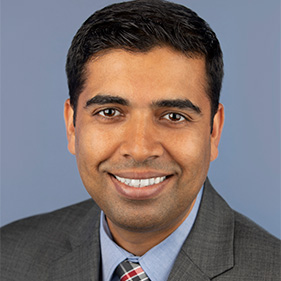UC Davis Health opens musculoskeletal ultrasound clinic for rheumatological conditions
UC Davis Health has established a new musculoskeletal ultrasound clinic dedicated to evaluating and treating patients with rheumatological conditions. The clinic is the first of its kind in the Sacramento region.
Located in the Lawrence J. Ellison Ambulatory Care Center, the clinic utilizes ultrasound-guided technology to diagnose and treat patients with inflammatory arthritis. The technology allows providers to look for fluid around the joints (joint effusion), synovial thickening (thickened tissue), joint erosions and gout or calcium crystal deposits.
“Musculoskeletal ultrasound is a valuable imaging modality for rheumatology and provides an efficient tool with high diagnostic value in the evaluation of patients with musculoskeletal complaints,” said Suraj Timilsina, assistant clinical professor of rheumatology and director of the musculoskeletal ultrasound clinic. “Using state-of-the-art ultrasound probes, we are able to improve clinical outcomes for our patients.”
Diagnosing rheumatic illnesses with ultrasound
Ultrasound has long been an effective and accepted procedure among many specialties but has only recently been adopted by rheumatologists.
The traditional diagnostic approach for rheumatologists includes a complete medical history, physical examination, laboratory tests, X-rays and MRI (magnetic resonance imaging) scans.
Ultrasound technology alows rheumatologists to scan multiple joints for inflammation and structural damage at one time. They can also measure blood flow through small vessels to evaluate the extent of inflammation, better identify fluid in joint pockets, measure crystal deposits for gout and analyze soft tissue structures (not just bones) like an X-ray would.
“The use of ultrasound has many practical advantages including diagnosing and treating rheumatological conditions earlier, better differentiating between illnesses and the ability to gauge the efficacy of medications,” explained Timilsina.
Research shows that earlier diagnosis and treatment of inflammatory joint diseases such as rheumatoid arthritis or gout results in improved outcomes for patients.
“While ultrasound will never completely replace the traditional diagnostic approach, it can be a useful tool to support us in evaluating and managing rheumatological conditions,” added Timilsina. “Ultimately, ultrasound has the ability to make us better rheumatologists.” Ultrasound has been recently used more often to diagnose large vessel vasculitis like giant cell arteritis and Takayasu’s arteritis and we hope to expand our service in these areas in the future.”
The use of ultrasound has many practical advantages including diagnosing and treating rheumatological conditions earlier, better differentiating between illnesses and the ability to gauge the efficacy of medications.” —Suraj Timilsina
Training the next generation of rheumatologists
As the region's only academic medical center, UC Davis Health's musculoskeletal ultrasound clinic is also focusing on training rheumatology fellows and residents to use ultrasound as a diagnostic tool.
“Due to the growing popularity of using ultrasound to diagnose rheumatological conditions, it is important we provide our rheumatology fellows and residents the training for diagnostic ultrasound and therapeutic ultrasound-guided procedures,” explained Timilsina.
In fact, the American College of Rheumatology has also published clinical guidance on the application of ultrasound in rheumatologic conditions.
“Our goal is to build ultrasound training into our fellowship curriculum and expand our services as much as possible in the future, including ultrasound of the blood vessels as well as muscles,” added Timilsina.





